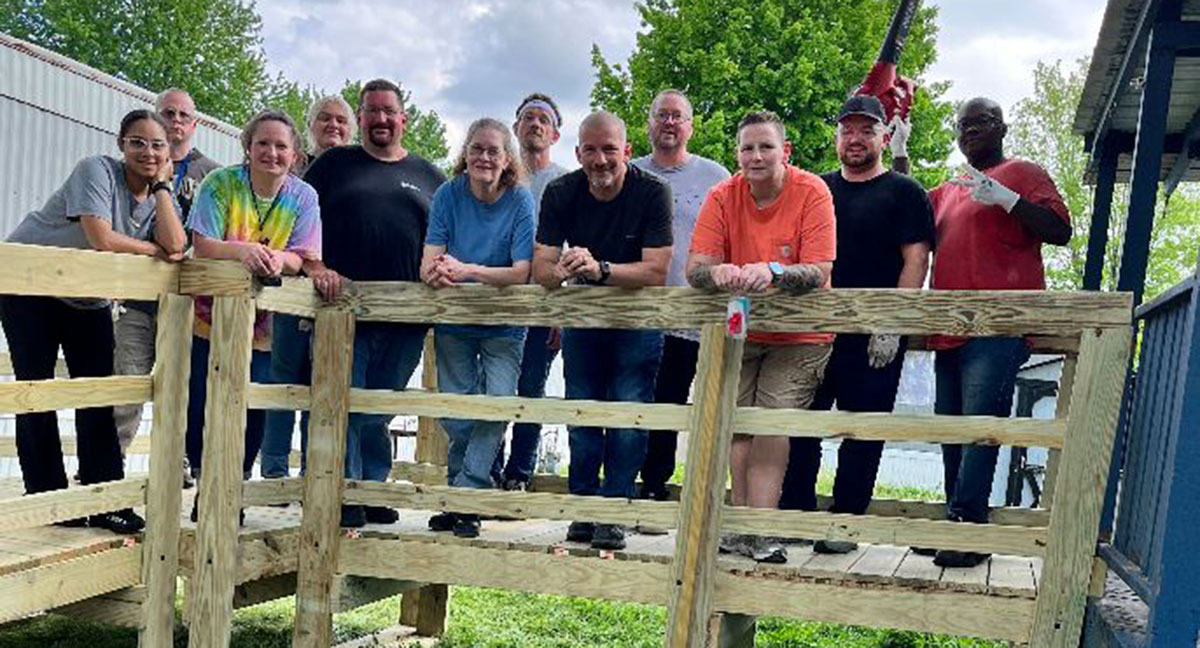What does freedom mean when you cannot even step outside your front door?
For many in Howard County, Indiana, who face mobility challenges, stepping outside is not a simple act — it’s a dream. That’s where SAWS comes in. Short for Servants at Work, SAWS is a faith-based nonprofit with a powerful mission: to provide free wheelchair ramps to low-income individuals with disabilities across Indiana. But the heart of this effort in Howard County beats in the hands of a man who knows firsthand what it means to lose — and to regain — mobility.
Bob Hill of Kokomo didn’t intend to become a community organizer or a local hero. He just saw a need and stepped in to help. Years ago, some members of his church needed ramps, so Bob did what he always does — he helped. That spirit of neighborly compassion soon led him to SAWS through a friend already involved with the organization. What began as helping out here and there became a deeper commitment, especially after a life-changing accident in 2019 left Bob in a wheelchair himself.
“I had a fall that paralyzed me,” Bob shares candidly. “I can’t build ramps anymore, but I can still design them, meet with families, and organize the teams. That’s how I serve now.”
And serve he does.
SAWS began more than 20 years ago when Rik Hagarty, a Carmel man, helped someone in his church who couldn’t leave their home without assistance. That single act of kindness grew into a statewide mission. Today, SAWS operates in 73 Indiana counties, with a goal of building 650 ramps in 2025 — 100 more than last year.
Howard County is no exception.
In his role coordinating SAWS’ work locally, Bob ensures that ramps go to the people who need them most: lower-income individuals without the financial resources or insurance to afford home modifications. The process begins when someone applies for a ramp on the SAWS website, sawsramps.org. Once approved, Bob visits the home, assesses the site, and starts working with local churches or businesses to rally volunteers.
“We do ADA-compliant ramps,” Bob explains. “That means if someone’s porch is 20 inches off the ground, we build a 20-foot ramp. But we also have to work with the yard space we have — sometimes we have to get creative.”
Creativity, in this case, is paired with compassion. Bob recalls a recent project in Tipton that left a lasting impression.
“We built a ramp for a woman who hadn’t been out of her home in months — unless the fire department carried her out for doctor visits. When she rolled down her new ramp for the first time, she just cried. That’s why we do this.”
Each ramp is built in a single day, usually between five to eight hours, depending on the size and the skill of the volunteers. Bob coordinates those teams, often reaching out to the applicant’s own church first, or to businesses who’ve stepped up to help over the years. He emphasizes that the SAWS model is 100% volunteer driven. The materials are provided by SAWS headquarters, funded through donations, church support, grants from local community foundations, and sometimes a small contribution from the homeowner.
“I don’t get paid. I don’t want to,” Bob says. “This isn’t about me. It’s about giving people back their freedom.”
Freedom, it turns out, often arrives one plank at a time.
The ramps don’t just restore access to the outside world. For many recipients, they are the final step before being discharged from rehab or returning home after surgery. In some cases, families are stuck in limbo, waiting to be reunited simply because there’s no safe way back into their home.
That’s the kind of life-altering impact Bob and the SAWS volunteers deliver week after week.
And he isn’t alone. Bob credits the efforts of churches, local businesses and community partners throughout Howard and Tipton counties for stepping up when he calls. From fundraising efforts to hands-on builds, the work is powered by collaboration.
Yet Bob remains humble. When asked how many ramps he’s overseen, he refuses to share a number. “I don’t want it to be about me,” he says. “It’s not a pat on the back. It’s the Lord’s work.”
Still, the scope is significant — roughly 20 ramps per year in Howard County alone. Each one tells a story of compassion, resilience and hope.
“People want to help,” Bob insists. “They just need to know how.”
Because sometimes, the path to independence begins not with a door — but with a ramp.
If your Church or business in Howard County would like to help support this mission or you know of someone in need of a ramp, reach out to Bob at bobhill22@comcast.com.
If you’d like to volunteer or donate, visit sawsramps.org. The website offers options to sign up, contribute financially or refer someone in need. You can also follow their efforts on Facebook to see recent builds and success stories.





